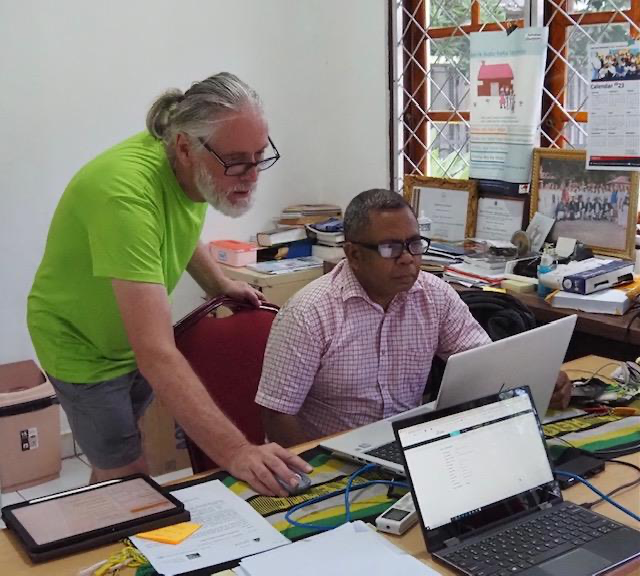
The Rotary Australia Worldwide Community Service (RAWCS) Project-Renovate and Repair Clinic has been assisting Klibur Domin’s information, communication and technology upgrade. Andrew Seagrave and Katrina Newman have spent two weeks as volunteers with this Rotary service project to assist Klibur Domin’s ICT. This is part of the journal that Katrina wrote.
Week 1
Andrew hit the ground running working in his usual style of total commitment. He worked through Friday andSaturday, with me alongside as general run about, until we met with the lovely Carmen, HR administrator ofKlibur Domin (KD) at her home for afternoon tea and meeting her family.
It’s now Wednesday and it appears this evening that we have wireless internet in KD. Andrew’s not quiteconfident enough to confirm that yet, however I can confirm from the sofa in the cottage where we are stayingon site, that it’s working quite well. Previous evenings we had no internet access at all. Thetelecommunication’s network in Timor-Leste is by all reports unreliable and overwhelmed. Today’s connectionof staff from the Community Based Rehabilitation (CBR) program was a long story. It took all day to connectonly two of their staff to the network and have them accessing their KD emails. Monday was much moreeventful with eight people connected to the network with access to their KD emails, a much better result.
It was great to engage with Joaquim Soares, Managing Director, Klibur Domin and share a working history inDisability Advocacy and learn about the Timor-Leste Disability Advocacy Association.
Chatting with the children in the student accommodation, Garton House, and giving them some of the booksthat were set aside for the school where their studying has been fun. They enjoyed engaging with us andpracticing their English language skills. I’ve found that English is well spoken here, however people are oftenshy or lack the confidence in speaking it. From my own experience when learning a language, this is probablyquite commonplace.
Week 2
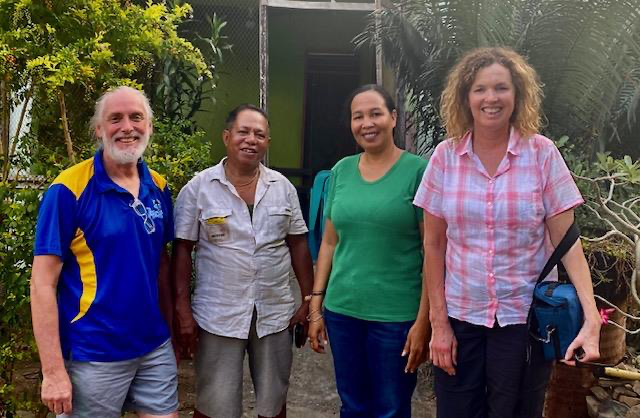
The project is winding up, Andrew is relieved that the design has proven itself, and he is satisfied that it is now90% complete and Klibur Domin is in a significantly better place than it was for ICT support.
There have been some issues along the way and throughout our time here. One of those was with the serverwhich was a gift from Lumify in Australia. It was to have the operating system installed, however it arrivedwithout, which meant a significant change to the implementation of the project to allow Andrew to complete hiswork.
However, the real issue that staff face at Klibur Domin, is that all their computers are very old. Staff often runmultiple versions of antivirus software, each computer has a different version of Windows, some runningWindows 11 on laptops that are many years old, so they’re not really capable of supporting the operatingsystem. There is no consistency throughout KD’s IT equipment. As a result, it made a simple process ofestablishing email accounts and mapping the shared drives more complicated and difficult than it needed tobe.
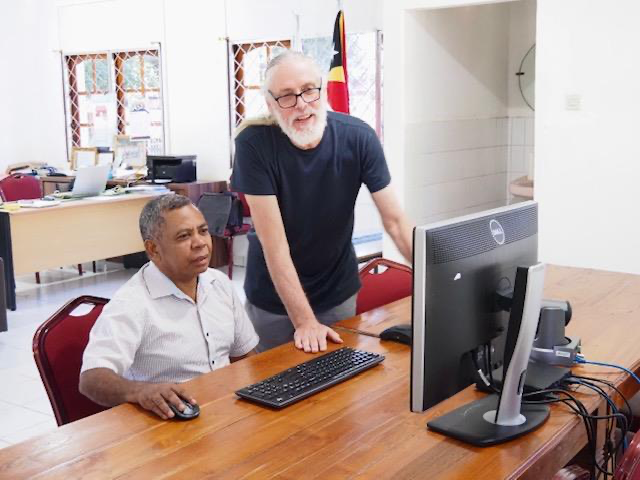
At KD it’s not only the pictures that tell the story, but the messages you receive on the computer screen.Messages that let you know there’ll be an issue when assisting staff with the transition. It was not only difficultfor us, but the staff lose valuable time away from their day-to-day work. Given reliable equipment across thevarious sites the work of KD staff would be so much more effective and far reaching.
During our two weeks at Tibar, Andrew was also required to provide many other solutions to IT issues thatarose not because of this project, but alongside it. He was effective no doubt given his skillset however, it tookvaluable but necessary time away from the project, just another demonstration that a patchwork of oldcomputer equipment is not sustainable for KD. All this extra work was essential. Especially the potential loss ofover two years of data, because the portable hard disk where the information was backed up, had beendamaged. Fortunately, due to our timely visit, Andrew was able to organise for the data to be recovered andbacked up. Many thanks to Innovar4 and their technician Domingos for the assistance in the data recovery.
Photocopying is also an issue for staff. On most days staff will travel into Dili to print multiple pages. We arehopeful that given the new shared drives, paper files will become less necessary.
One of the last hurdles we faced was connecting the TB lab to the wireless network (WWAN). By switching theEnterprise Access Point antennas around we were finally able to connect the TB Laboratory to the WWAN,after trying unsuccessfully for many days. Phew! The smiles from Andrew and staff at the TB Lab weresignificant.
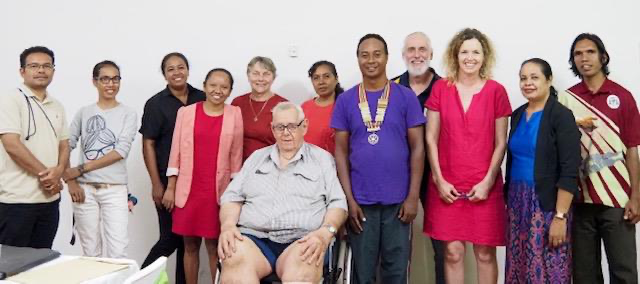
We also attended a Rotary Dili meeting in the Timor offices of Rotarians Helping Dili.
We learnt about several of their projects, met the Charter President and shared information about the projectwe’ve been working on at KD.
Side Trips
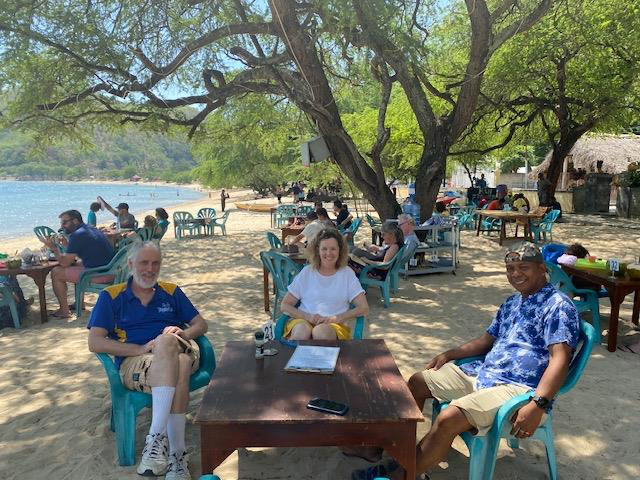
We enjoyed two Sundays of casual time on this trip. On both occasions we enjoyed the company of Franciscofrom Global Fund who Andrew struck up a friendship with on his first visit here. Francisco was a lovely guidewith his 12-year-old daughter Jessica in tow on our first Sunday and Jessifa on the second. We were driventhrough Dili, and via the President’s home where we watched as local children, who are invited to play in hisgardens and pool enjoy the moment. We drove along the picturesque beach road, and across a range andthen back via a small agricultural village. We enjoyed lunch in a lovely cafe restaurant on the beach not farfrom Christo Rei.
Prior to our travel to Dili, Ann Dalby assisted with a significant collection of books for the boarding school girlsat the Convent School across the road from Klibur Domin. We arranged an extra 20 kgs of baggage eachthrough Ryder-Cheshire, which meant we were able to deliver most of them on our visit. The girls were thrilledand absolutely dived into the books.
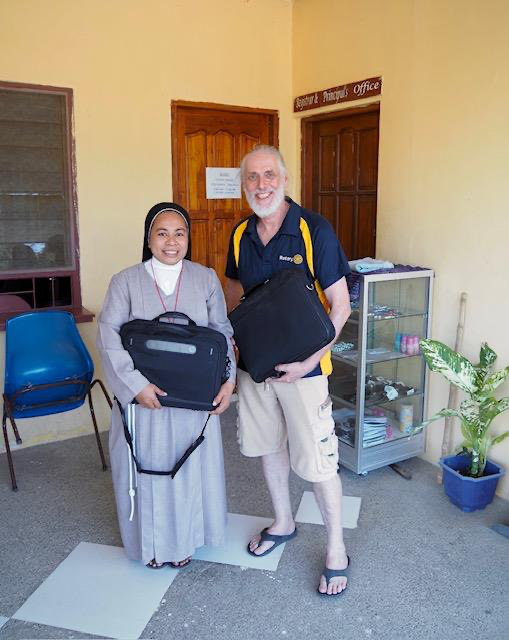
On another separate visit to the school, we delivered two computers donated by students from Tenison Woods College in Mount Gambier. The school principal, Sister Albina, made a request for tables and chairs toaccommodate the 450+ students in their 6 classrooms. However, during the Dili Rotary meeting we learnt thattables and chairs are high on the wish list of schools across Timor-Leste, so much so that they’re not takingany further requests this year.
Future
A number of needs have been identified for the next phase of the project.
The server needs to be configured and joined to the network. This in turn will allow the computers to be joinedto a domain which will improve security. However the dependency for this is that the corporate PC/Laptop fleetbe standardised to a single manufacturer, with a standard operating
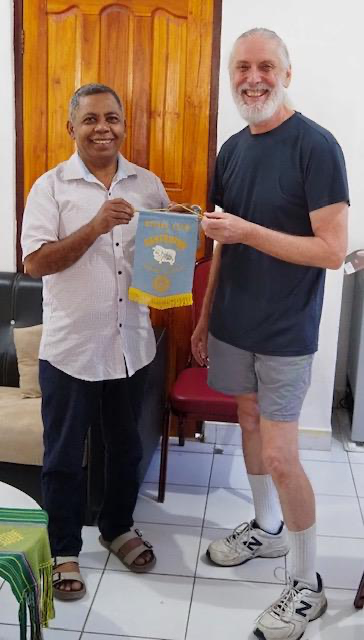
Environment (SOE) build is being installed. There will be a need for a minimum of twenty laptops for this phaseto replace the older devices currently in use.
Whilst we have obtained Microsoft 365 licences for staff at Klibur Domin, they have only been rolled out to acouple of users. A full rollout is needed, however the dependency here is also new laptops as there is a needfor an officially licenced copy of Windows to be on connected devices. This rollout will encompass the staff atthe Tibar facility and also the remote staff at Baucau.
ICT Support is also an area of need. Klibur Domin has identified the need for a support role and isinvestigating how to establish one given current funding constraints. Once staffing is in place, support for theproject can be transitioned from Australia to Timor-Leste, and staff trained. The role will not only encompassnetwork and desktop support, but also maintenance and update of the Klibur Domin website.
Katrina Newman